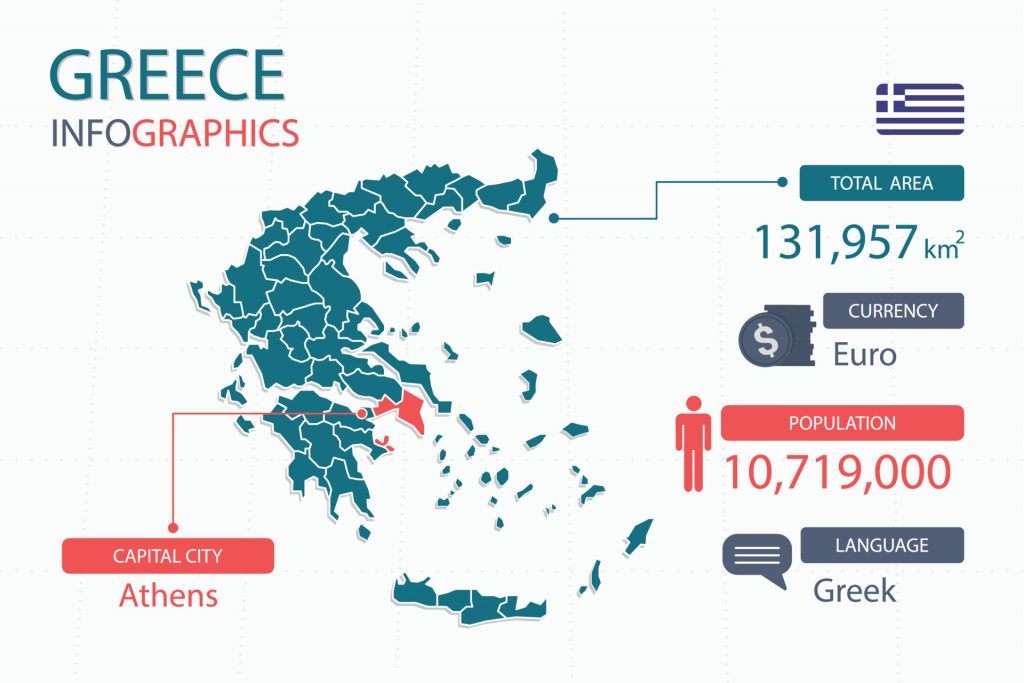The origins of the Greek Language
Greek is a language that holds historical importance in a variety of fields, including linguistics, philosophy, literature, and religion. Written work in Greek is well-documented and the language has played a crucial role in terms of the development of other languages as well. Currently, it is the official language in both Greece and Cyprus, as well as holding official status in the European Union. In addition, it is spoken in many other countries; it is a recognized minority language in Albania, Armenia, Italy, Ukraine, and a number of other countries as well. Moreover, it is spoken in a number of communities around the world where Greek communities exist. Ancient Greek, its earlier iteration is also studied widely in academia due to its scholarly value.
The Greek language has been a vehicle of the most important literary texts in Western civilization as it is the language used to produce the most foundational texts in philosophy, science, and mathematics. Greek symbols are still prominent in these fields. Equally as important, the majority of mathematical and technological terminology stems from either Greek or Latin. In addition, Greek script was found on the Rosetta stone, a stone that documents a decree issued in Egypt. The decree was written in Ancient Egyptian hieroglyphs, the Demotic script, and Ancient Greek. Thus, Ancient Greek was used to gain a deeper understanding of Ancient Egyptian hieroglyphs when it was discovered as the translations between all three scripts were very similar, thus helping historians gain a deeper understanding of these Ancient civilizations and their social and cultural interactions.
Modern Greek draws most of its extensive vocabulary from Ancient Greek. In the past, however, it drew from other Hellenic languages that were prominent in the Greek isles. Throughout history, vocabulary from a variety of other languages has also made its way into the language. In more ancient times, Latin, Venetian, and Turkish were prominent sources of borrowing. Starting in the 20th century, the status of French and English led these languages to be another source of extensive borrowing. Not only has it borrowed from other languages, though, but a plethora of languages throughout the world have borrowed heavily from Greek throughout time. The most basic of everyday words come from Greek in many languages, especially ones relating to academics and the arts (e.g., words like mathematics, democracy, and theatre).
Greek is classified as an Indo-European language, which is further up the family tree. It extends from the family of Indo-European languages as an independent language. Despite it being a bit ‘lonely’ in this sense, some linguists believe that Armenian is closely related to it, as well as Albanian. However, in general, most linguists are unable to logically group it with any other living language thus far.
Modern Greek is written with the Greek alphabet, a modification of the Phoenician alphabet in a combination of other elements. It consists of 24 letters Proto-Greek, with both capital and lowercase forms. Some Greek letters are similar to, if not the same as the Latin alphabet, but may not represent the same sounds or pronunciations. In addition, there are a number of accents that change the sounds of the letters. An interesting aspect is a punctuation. For example, the Greek question mark is actually the English semicolon (;). The comma (,) is also a filler letter for some words. The Greek alphabet was not always used throughout history to write the language, most notably under Venetian rule, when the Latin script was utilized. Many Greek Catholics also use the Latin alphabet, as it is very strongly associated with the spread of Catholicism.

Greek is the current living language that has the oldest history of documentation. As Greek is extensively documented, the body of literature describing its progress throughout history has been very descriptive. Scholars have divided Greek into six historical periods:
1.Proto-Greek 2. Mycenaean Greek 3. Ancient Greek4. Koine Greek5. Medieval Greek and 6. Modern Greek.
Proto-Greek refers to the linguistic variety from which the Greek language is derived. In general, it is considered the language of the migrants who had first entered the Greek peninsula. Rather than being just one language, it was most likely a group of similar dialects. These dialects interacted with each other to form Mycenaean Greek, the language that is used during the Mycenaean civilization. It is most notable for being written in a script called Linear B, and specifically on tablets.
Ancient Greek is the next major evolution of Greek, especially as it is representative of Ancient Greece, its civilizations, and different peoples. It served as a lingua franca throughout the Mediterranean, even being widely used language in the Roman Empire. During the Middle Ages, it was not used as much in Western Europe but remained prominently in the Byzantine Empire. However, as much of the work in the Western literary canon is written in Ancient Greek, it still continued a scholarly role during this time.
Koine Greek is based on a fusion of a dialect of Athens called Attic and Ionian. This version of Greek became a lingua franca in the Eastern Mediterranean as well as the Near East. It is most notable as the first common Greek dialect used extensively as a vernacular language. Before this, Greek was used mostly in a literary fashion, while the spoken vernaculars were a variety of dialects that existed in the region. Koine Greek was spoken by armies in the territories conquered by Alexander the Great. It was also spoken in vast regions ranging from Egypt to some parts of India. Koine Greek also played an integral role in spreading Christianity and thus is sometimes known as New Testament Greek or Biblical Greek, as it was the original language of the New Testament.
Medieval Greek, the next iteration of the language, is also known as Byzantine Greek. It describes both vernacular and written Greek registers. It is considered a continuation of Koine Greek. Medieval Greek gave way to Modern Greek during the 15th century.
The Modern Greek that emerged in the 15th century is the basis of the modern standard dialect that is used today. Greek today manifests itself in several modern dialects. In addition, the Greek language also exhibits diglossia, where the written language and the spoken language differs quite significantly. In 1976, Dimotiki, the modern vernacular was declared Greece’s official language, being used as the official administrative and educational languages. With such an extensive history, an important position in terms of understanding of many fields, Greek remains an important language that scholars still study and try to comprehend, both in its ancient and modern forms. With Greek culture still holding importance in Western civilization, the language plays a critical role.
VEQTA can provide you with a perfect Greek translator for your Greek translation, English to Greek translation and Greek to english translation for the your targeted locale. Our translations to Greek are created with your target audience in mind to meet your expectations.
If you need to translate Greek – Get in touch today!
A dedicated team of Greek translators who combines Experience, Specialized Subject Matter Expertise with Translation Practices to deliver quality second to none.
Greek Subject Expertise
Greek Translators
Greek Editors
Greek Copywriters
Greek Reviewers
Greek Voice dubbing
Greek Subtitling
Greek Transcription


